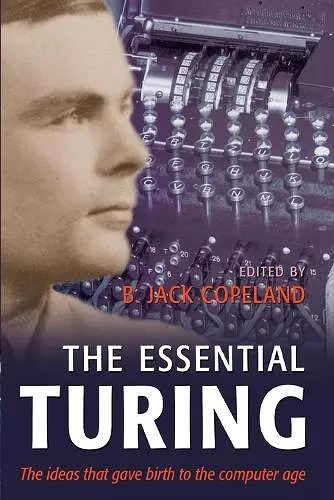The Essential Turing
Format:Paperback
Publisher:Oxford University Press
Published:9th Sep '04
Currently unavailable, and unfortunately no date known when it will be back
This paperback is available in another edition too:
- Hardback£130.00(9780198250791)

Alan Turing, pioneer of computing and WWII codebreaker, is one of the most important and influential thinkers of the twentieth century. In this volume for the first time his key writings are made available to a broad, non-specialist readership. They make fascinating reading both in their own right and for their historic significance: contemporary computational theory, cognitive science, artificial intelligence, and artificial life all spring from this ground-breaking work, which is also rich in philosophical and logical insight. An introduction by leading Turing expert Jack Copeland provides the background and guides the reader through the selection. About Alan Turing Alan Turing FRS OBE, (1912-1954) studied mathematics at King's College, Cambridge. He was elected a Fellow of King's in March 1935, at the age of only 22. In the same year he invented the abstract computing machines - now known simply as Turing machines - on which all subsequent stored-program digital computers are modelled. During 1936-1938 Turing continued his studies, now at Princeton University. He completed a PhD in mathematical logic, analysing the notion of 'intuition' in mathematics and introducing the idea of oracular computation, now fundamental in mathematical recursion theory. An 'oracle' is an abstract device able to solve mathematical problems too difficult for the universal Turing machine. In the summer of 1938 Turing returned to his Fellowship at King's. When WWII started in 1939 he joined the wartime headquarters of the Government Code and Cypher School (GC&CS) at Bletchley Park, Buckinghamshire. Building on earlier work by Polish cryptanalysts, Turing contributed crucially to the design of electro-mechanical machines ('bombes') used to decipher Enigma, the code by means of which the German armed forces sought to protect their radio communications. Turing's work on the version of Enigma used by the German navy was vital to the battle for supremacy in the North Atlantic. He also contributed to the attack on the cyphers known as 'Fish'. Based on binary teleprinter code, Fish was used during the latter part of the war in preference to morse-based Enigma for the encryption of high-level signals, for example messages from Hitler and other members of the German High Command. It is estimated that the work of GC&CS shortened the war in Europe by at least two years. Turing received the Order...
The editor not only presents the Turing seminal papers and ingenious contributions to fields he was far ahead his time, he also gives easy access for non-specialists by his comprehensive introductions and comments. * Volker Peckhaus, Zentralblatt MATH 1076 *
ISBN: 9780198250807
Dimensions: 242mm x 166mm x 32mm
Weight: 884g
624 pages